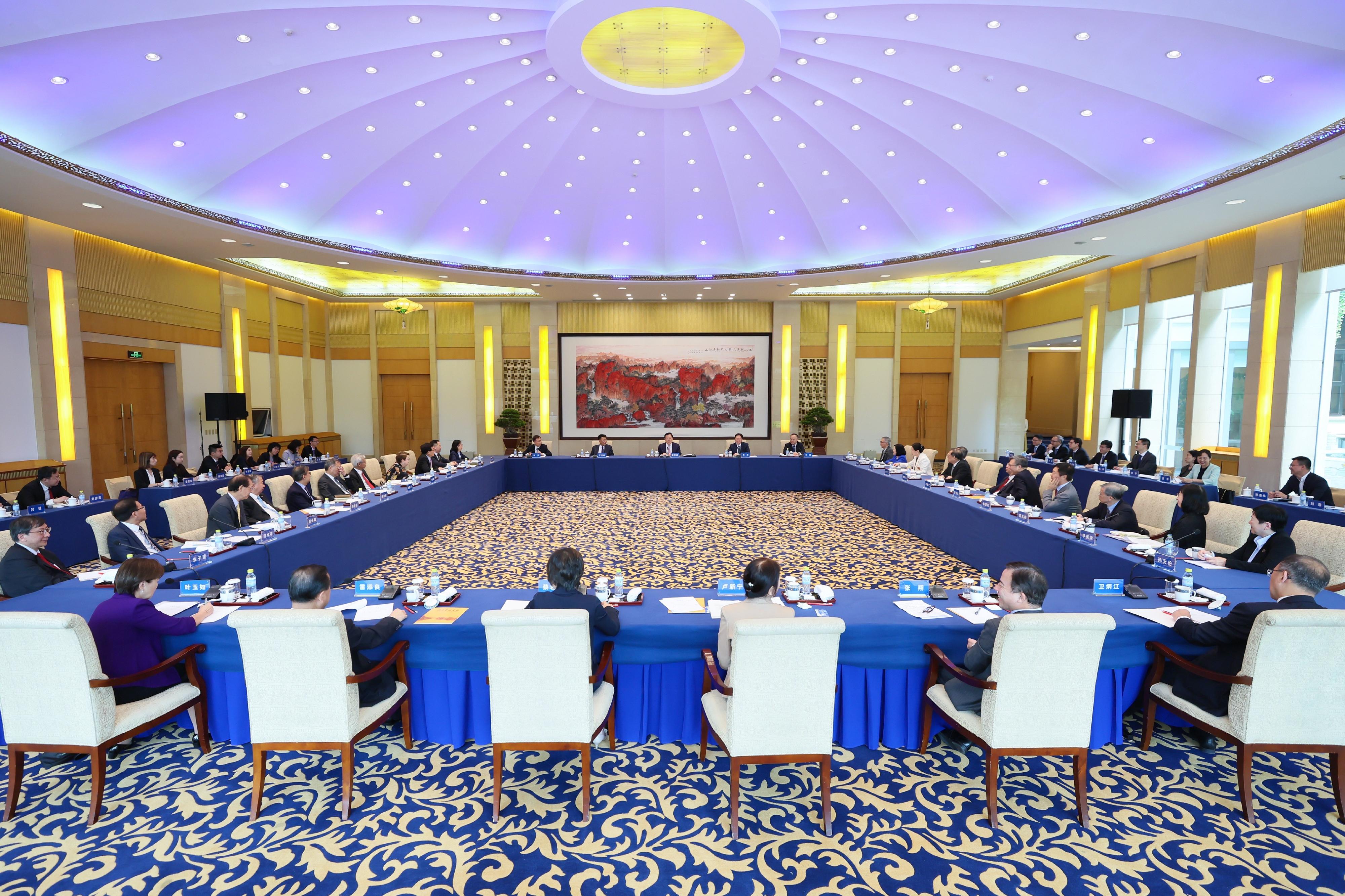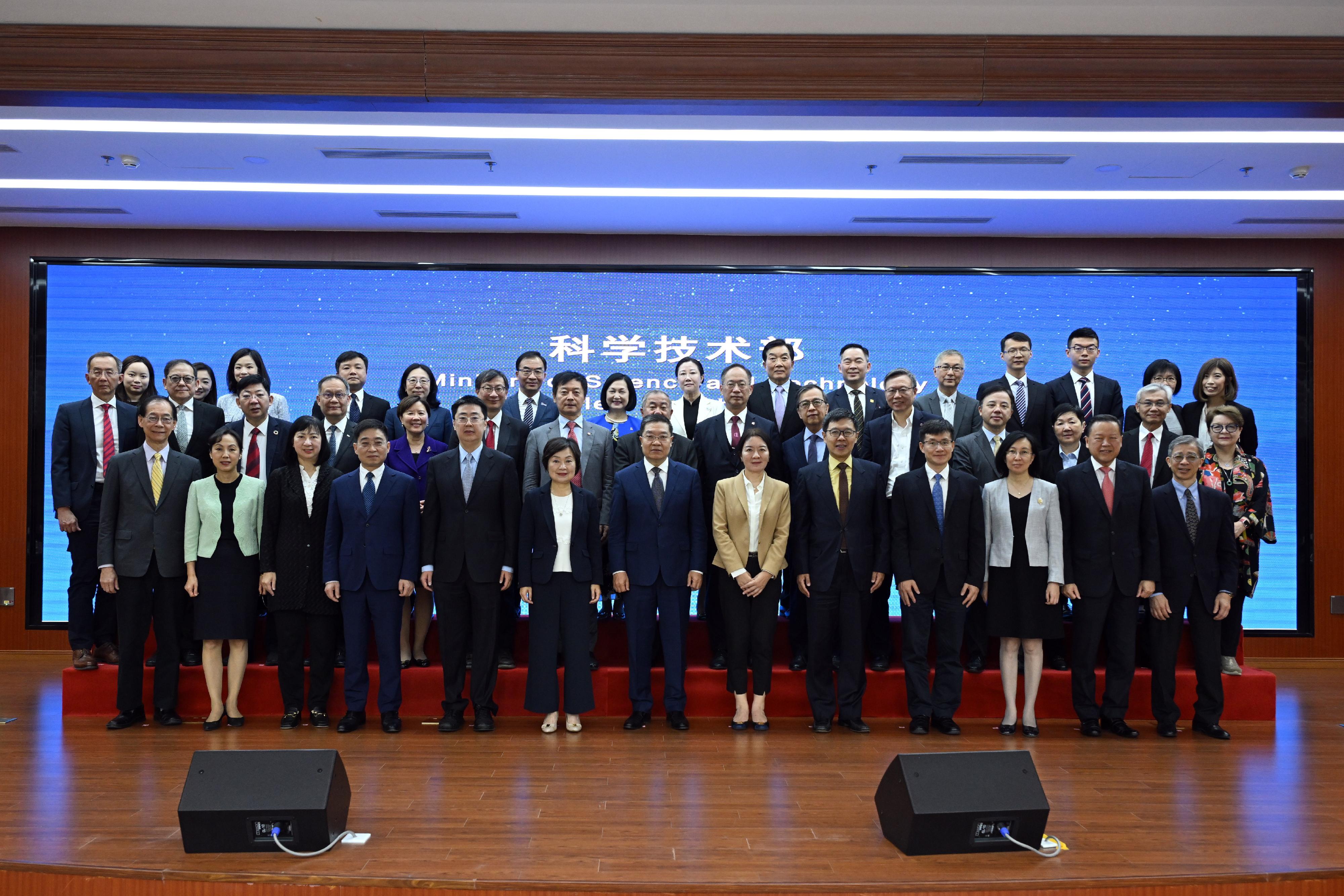SED continues to lead HK higher education institution delegation to visit Beijing (with photos)
The Secretary for Education, Dr Choi Yuk-lin, today (May 10) continued to lead the delegation of Hong Kong higher education institutions to visit Beijing. They called on the Hong Kong and Macao Affairs Office of the State Council and the Ministry of Science and Technology, and visited a technology enterprise.
In the morning, the delegation called on the Director of the Hong Kong and Macao Work Office of the Communist Party of China Central Committee and the Hong Kong and Macao Affairs Office of the State Council, Mr Xia Baolong, to report on the latest developments of Hong Kong's higher education sector. Dr Choi expressed gratitude to Mr Xia for his constant care and love for Hong Kong.
Mr Xia pointed out that Hong Kong's higher education has unique advantages, including high teaching quality, strong basic research capabilities, extensive international connections, and solid co-operation with the Mainland, representing a strong foundation and huge influence.
He said that Hong Kong's education is an important part of national education. Universities must keep in mind the importance of cultivating more talent, producing more scientific research outcomes, and making more contributions to national development. He hoped that the leaders of Hong Kong's higher education institutions will shoulder their important responsibilities of adhering to the fundamentals of cultivating values and nurturing talent, strengthening their affection for and sense of belonging to the country, and enthusiastically promoting the key message of love for the country and Hong Kong; following firmly the strategy of developing their institutions with quality talent, reinforcing the cultivation and attraction of talent, and providing strong support for young students to become talent; persisting in giving full play to their unique advantages, and contributing Hong Kong's wisdom and strengths in the construction of a leading country in education.
He emphasised that the Central Government will fully, faithfully and unswervingly ensure that the "one country, two systems" principle remains unchanged, and wholeheartedly support Hong Kong in achieving a leap forward at the new stage. All must be united and proactively support the Chief Executive and the Hong Kong Special Administrative Region Government in governing Hong Kong in accordance with the law, and fully leveraging Hong Kong's advantages under "one country, two systems" and as an international city, working together to build an international education hub, and contributing further to Hong Kong in its transition from stability to prosperity and the great rejuvenation of the Chinese nation.
Dr Choi said that the active participation of the leaders of the 22 Hong Kong higher education institutions in the study group has not only made history for Hong Kong's higher education sector, it also demonstrated the sector's unity, carrying great significance.
She pointed out that with the implementation of the Hong Kong National Security Law, an improved electoral system and the Basic Law Article 23 legislation, a stable environment for development has been created. Coupled with the goal of building a leading country in education by 2035, Hong Kong's higher education will enjoy a golden opportunity for development in the next decade. The Hong Kong Special Administrative Region Government will give full support to institutions for continuous innovation and optimisation, and giving full play to the strengths of Hong Kong's first-class universities, to develop Hong Kong into an international hub for post-secondary education.
The delegation also called on the Ministry of Science and Technology to gain a deep understanding of the latest trend of national science and technology development, the overall national development, and the goal of building a nation strong in science and technology. Dr Choi said that Hong Kong and the Mainland have been working closely in the area of scientific and technological innovation, and Hong Kong's researchers are an indispensable force in building a nation strong in science and technology. She said that the Hong Kong Special Administrative Region Government has all along been committed to promoting STEAM (Science, Technology, Engineering, Arts and Mathematics) education to nurture future talent for the country and Hong Kong.
In the afternoon, the delegation visited a Mainland technology enterprise to learn about the development trend of digital economy on the Mainland and explore opportunities for collaboration.
Members of the delegation include the Permanent Secretary for Education, Ms Michelle Li; the Chairman of the University Grants Committee (UGC), Mr Tim Lui; the Chairman of the Research Grants Council, Professor Timothy Tong; the Chairman of the Committee on Self-financing Post-secondary Education, Dr Alex Chan; and presidents or representatives of eight UGC-funded universities, 13 degree-awarding self-financing post-secondary institutions and the Hong Kong Academy for Performing Arts. The delegation concluded its visit to Beijing today.
Tomorrow (May 11), Dr Choi will meet leaders of the National Academy of Education Administration to explore further co-operation between Hong Kong and Mainland teacher training institutions. She will also attend the closing ceremony of a Mainland study tour for Hong Kong's promoted teachers held at the Academy. About 70 promoted teachers participated in the study tour, which included thematic talks, visits to schools and enterprises, and cultural visits that enabled teachers to learn about the latest developments in various areas of the country, and exchange views with Mainland school leaders for more effective promotion of school development.
Dr Choi will conclude her visit and return to Hong Kong tomorrow afternoon.


